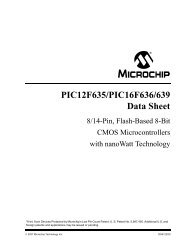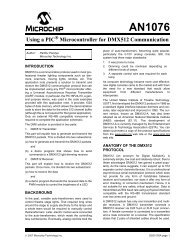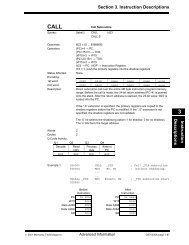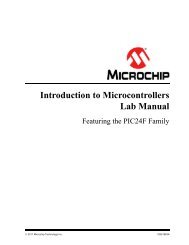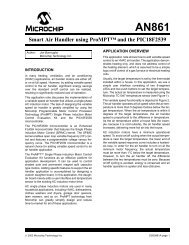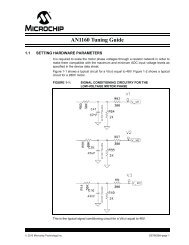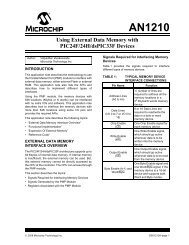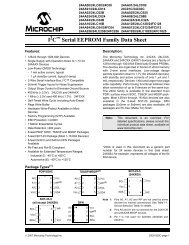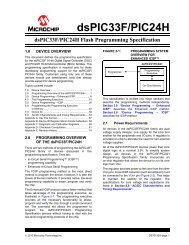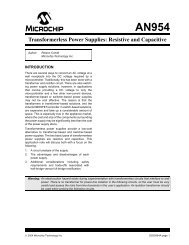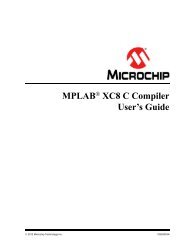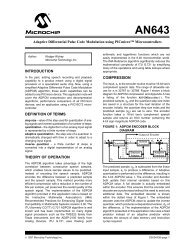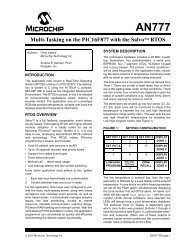- Page 1 and 2: MPLAB ® C COMPILER FOR PIC24 MCUs
- Page 3 and 4: MPLAB ® C COMPILER FOR PIC24 MCUs
- Page 5 and 6: Table of Contents A.5 Identifiers .
- Page 7 and 8: INTRODUCTION MPLAB ® C COMPILER FO
- Page 9 and 10: CONVENTIONS USED IN THIS GUIDE The
- Page 11 and 12: THE MICROCHIP WEB SITE Preface C Re
- Page 13 and 14: 1.1 INTRODUCTION 1.2 HIGHLIGHTS MPL
- Page 15 and 16: 1.5 COMPILER FEATURE SET Compiler O
- Page 17 and 18: MPLAB ® C COMPILER FOR PIC24 MCUs
- Page 19: Differences Between 16-Bit Device C
- Page 23 and 24: Differences Between 16-Bit Device C
- Page 25 and 26: Differences Between 16-Bit Device C
- Page 27 and 28: Differences Between 16-Bit Device C
- Page 29 and 30: Differences Between 16-Bit Device C
- Page 31 and 32: Differences Between 16-Bit Device C
- Page 33 and 34: Differences Between 16-Bit Device C
- Page 35 and 36: Differences Between 16-Bit Device C
- Page 37 and 38: Differences Between 16-Bit Device C
- Page 39 and 40: MPLAB ® C COMPILER FOR PIC24 MCUs
- Page 41 and 42: Using the Compiler on the Command L
- Page 43 and 44: Using the Compiler on the Command L
- Page 45 and 46: Using the Compiler on the Command L
- Page 47 and 48: Using the Compiler on the Command L
- Page 49 and 50: Using the Compiler on the Command L
- Page 51 and 52: Using the Compiler on the Command L
- Page 53 and 54: Using the Compiler on the Command L
- Page 55 and 56: Using the Compiler on the Command L
- Page 57 and 58: Using the Compiler on the Command L
- Page 59 and 60: Using the Compiler on the Command L
- Page 61 and 62: Using the Compiler on the Command L
- Page 63 and 64: Using the Compiler on the Command L
- Page 65 and 66: 3.6 ENVIRONMENT VARIABLES Using the
- Page 67 and 68: Using the Compiler on the Command L
- Page 69 and 70: 4.1 INTRODUCTION 4.2 HIGHLIGHTS 4.3
- Page 71 and 72:
4.5 MEMORY SPACES Run Time Environm
- Page 73 and 74:
Run Time Environment 1. It is possi
- Page 75 and 76:
4.8 SOFTWARE STACK Run Time Environ
- Page 77 and 78:
FIGURE 4-2: CALL OR RCALL Stack gro
- Page 79 and 80:
4.11 FUNCTION CALL CONVENTIONS Run
- Page 81 and 82:
Run Time Environment The compiler a
- Page 83 and 84:
4.14.2 String Literals as Arguments
- Page 85 and 86:
5.1 INTRODUCTION 5.2 HIGHLIGHTS MPL
- Page 87 and 88:
6.1 INTRODUCTION MPLAB ® C COMPILE
- Page 89 and 90:
6.3 PMP POINTERS Additional C Point
- Page 91 and 92:
6.4 EXTERNAL POINTERS 6.3.3 Define
- Page 93 and 94:
ead_external16 Additional C Pointer
- Page 95 and 96:
Additional C Pointer Types } else {
- Page 97 and 98:
7.1 INTRODUCTION 7.2 HIGHLIGHTS MPL
- Page 99 and 100:
7.5 USING SFRS Device Support Files
- Page 101 and 102:
7.6 USING MACROS Device Support Fil
- Page 103 and 104:
EXAMPLE 7-2: EEDATA ACCESS VIA PSV
- Page 105 and 106:
8.1 INTRODUCTION 8.2 HIGHLIGHTS MPL
- Page 107 and 108:
Interrupts When using the interrupt
- Page 109 and 110:
8.4.1 dsPIC30F DSCs (Non-SMPS) Inte
- Page 111 and 112:
8.4.3 PIC24F MCUs Interrupt Vectors
- Page 113 and 114:
Interrupts TABLE 8-3: INTERRUPT VEC
- Page 115 and 116:
Interrupts TABLE 8-4: INTERRUPT VEC
- Page 117 and 118:
85 _Interrupt85 _AltInterrupt85 Res
- Page 119 and 120:
8.8 ENABLING/DISABLING INTERRUPTS I
- Page 121 and 122:
Interrupts 2. Unsafe: read bar inte
- Page 123 and 124:
LATGbits.LATG2 = 0; /* No problem l
- Page 125 and 126:
MPLAB ® C COMPILER FOR PIC24 MCUs
- Page 127 and 128:
Mixing Assembly Language and C Modu
- Page 129 and 130:
Mixing Assembly Language and C Modu
- Page 131 and 132:
Mixing Assembly Language and C Modu
- Page 133 and 134:
Mixing Assembly Language and C Modu
- Page 135 and 136:
MPLAB ® C COMPILER FOR PIC24 MCUs
- Page 137 and 138:
A.5 IDENTIFIERS A.6 CHARACTERS Impl
- Page 139 and 140:
Implementation-Defined Behavior The
- Page 141 and 142:
A.15 PREPROCESSING DIRECTIVES Imple
- Page 143 and 144:
A.17 SIGNALS A.18 STREAMS AND FILES
- Page 145 and 146:
A.24 GETENV A.25 SYSTEM A.26 STRERR
- Page 147 and 148:
B.1 INTRODUCTION MPLAB ® C COMPILE
- Page 149 and 150:
__builtin_btg Built-in Functions De
- Page 151 and 152:
__builtin_clr_prefetch Argument: xp
- Page 153 and 154:
__builtin_dmaoffset Built-in Functi
- Page 155 and 156:
__builtin_fbcl Built-in Functions A
- Page 157 and 158:
__builtin_modsd Argument: dividend
- Page 159 and 160:
__builtin_mpy Error Messages An err
- Page 161 and 162:
__builtin_mulss Built-in Functions
- Page 163 and 164:
__builtin_psvoffset Built-in Functi
- Page 165 and 166:
__builtin_subab Built-in Functions
- Page 167 and 168:
__builtin_tblwth Built-in Functions
- Page 169 and 170:
C.1 INTRODUCTION C.2 ERRORS MPLAB
- Page 171 and 172:
Diagnostics ambiguous abbreviation
- Page 173 and 174:
Diagnostics cast specifies function
- Page 175 and 176:
F Diagnostics ‘identifier’ fail
- Page 177 and 178:
Diagnostics initializer for static
- Page 179 and 180:
Diagnostics invalid use of undefine
- Page 181 and 182:
N Diagnostics negative width in bit
- Page 183 and 184:
R Diagnostics redeclaration of ‘i
- Page 185 and 186:
Diagnostics symbol ‘symbol’ not
- Page 187 and 188:
Diagnostics void expression between
- Page 189 and 190:
Diagnostics anonymous union declare
- Page 191 and 192:
Diagnostics comparison between sign
- Page 193 and 194:
duplicate ‘const’ The ‘const
- Page 195 and 196:
Diagnostics function might be possi
- Page 197 and 198:
Diagnostics ‘identifier’ is nar
- Page 199 and 200:
Diagnostics library function ‘ide
- Page 201 and 202:
P Diagnostics parameter has incompl
- Page 203 and 204:
Diagnostics shift count >= width of
- Page 205 and 206:
Diagnostics too many arguments for
- Page 207 and 208:
V Diagnostics __VA_ARGS__ can only
- Page 209 and 210:
MPLAB ® C COMPILER FOR PIC24 MCUs
- Page 211 and 212:
MPLAB C Compiler for PIC18 MCUs vs.
- Page 213 and 214:
MPLAB C Compiler for PIC18 MCUs vs.
- Page 215 and 216:
MPLAB C Compiler for PIC18 MCUs vs.
- Page 217 and 218:
E.1 INTRODUCTION E.2 HIGHLIGHTS MPL
- Page 219 and 220:
MPLAB ® C COMPILER FOR PIC24 MCUs
- Page 221 and 222:
G.1 PREAMBLE MPLAB ® C COMPILER FO
- Page 223 and 224:
G.3 VERBATIM COPYING G.4 COPYING IN
- Page 225 and 226:
GNU Free Documentation License incl
- Page 227 and 228:
MPLAB ® C COMPILER FOR PIC24 MCUs
- Page 229 and 230:
Glossary File Registers On-chip dat
- Page 231 and 232:
Glossary Machine Language A set of
- Page 233 and 234:
Glossary Stack, Software Memory use
- Page 235 and 236:
Symbols __builtin_add..............
- Page 237 and 238:
-fpack-struct .....................
- Page 239 and 240:
-idirafter.........................
- Page 241 and 242:
Peephole Optimization..............
- Page 243 and 244:
-Wsequence-point...................





